Forum Replies Created
-
AuthorReplies
-
I got the same. Every two minutes across several hours.
March 12, 2023 at 2:12 pm in reply to: Population decline and the disappearance of nationhood #249477Agree and disagree.
‘Non-sustainability’ is an ideological construct. It floats the narrative that societies must learn to adapt to ever greater restrictions on standards of living. Veblen demonstrated profits can be created through the destruction of production. Recently, CP wrote on how, due to failing differential rates of return globally, corporations will seek to impose differential advantages locally, on national populations via more totalitarian governance.
I predict, with the fuller retraction of the American globalist project, an odd future looms ahead: ever increased local production combined with greater levels of austerity among the working classes. Already that is set in play with the hollowing out of the middle classes throughout North America. However, return to local production threatens to rejuvenate the middle class. That threat will be eradicated as governments impose restrictions blaming resource shortages, climate change, etc. It is all strictly ideological and serves of course the status quo.
However, I agree with the sense at least that the natural order seems to prefer balance, which is what you apply in the notion that decreased population sizes are required to balance strain on the planet. But I disagree with your premise simply because fertility declines have nothing to do with questions of ‘sustainability’. People have stopped reproducing while resources are abundant (and, given the science of what makes a thing a resource, can only remain abundant) and living standards are the highest in known history.
March 11, 2023 at 3:01 pm in reply to: Population decline and the disappearance of nationhood #249468And yet…
According to the UN, world population is projected to increase.
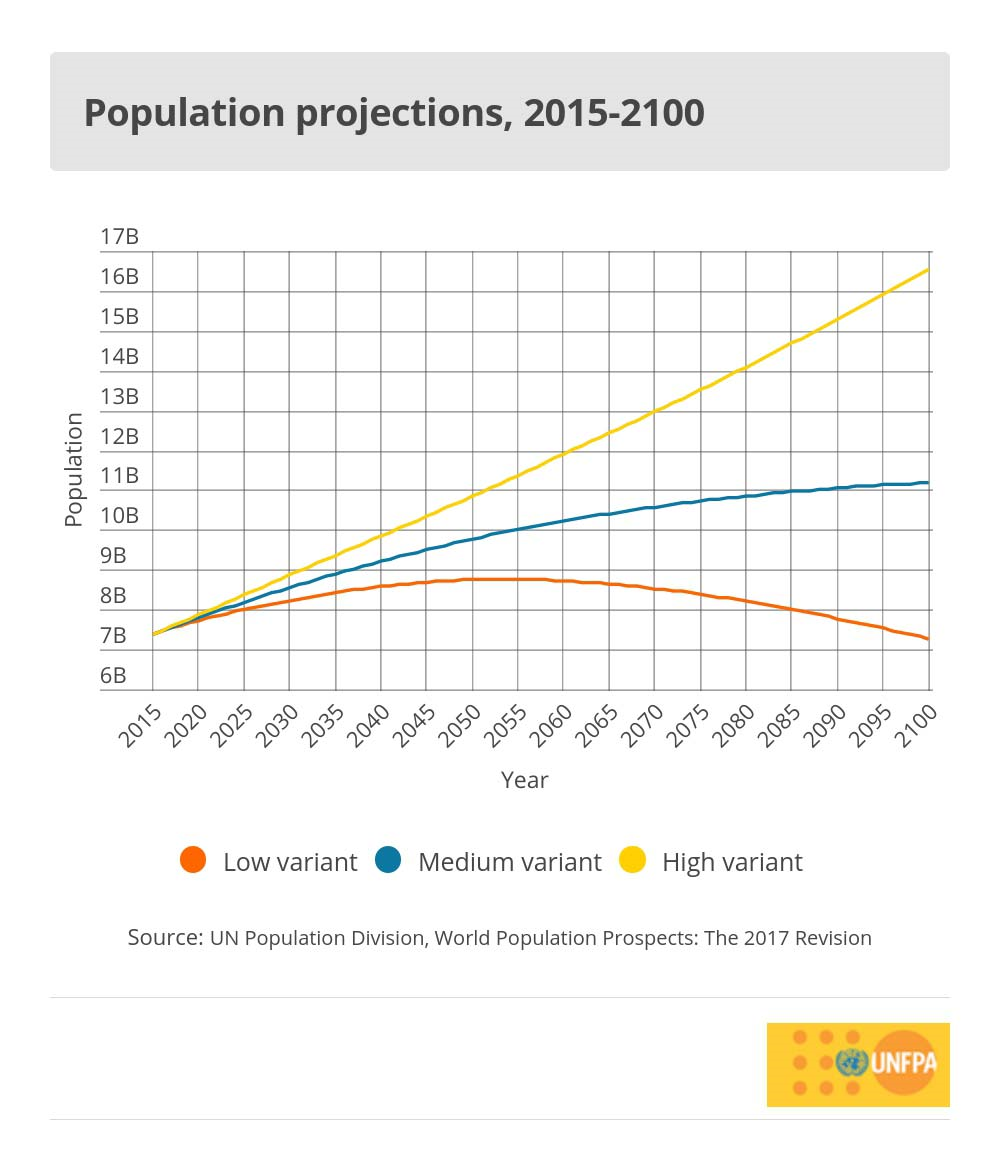
And while acknowledging “n the early 1970s, a woman had on average 4.5 children; by 2021, the average global fertility rate had fallen to 2.3 children per woman”, the UN predicts that due to various unique factors in societal developments the earth could surpass 10b persons by the end of century.
Summation of UN argument:
- general higher standards of living worldwide mean more people survive childhood and live into old age
- certain developing countries are expected to double populations
However, this paragraph is telling:
“Age distribution also affects whether populations expand or contract. Today, there are more adolescents and young people than ever before. As these youth age into parenthood, their strength in numbers will drive continued global population growth, despite falling fertility rates.”
It suggests therefore, there is no need for concern about declining fertility rates (see charts at beginning).
But
- that’s the whole point – as they age into parenthood they will continue current trends: declining fertility rates
- the greatest population boom in recent history was post-war. This claim therefore could only refer to developing world populations.
- Later, in this document, the UN contradicts the quote above, stating that it is solely in Africa where “adolescents and youth” numbers are expected to continue rising while, outside of Africa, all other major population centers are expected to continue declining.
The UN position on negative replacement rates is inadequate and misleading. What it means by overpopulation refers to almost strictly Africa. It completely ignores the shadow side of general higher standards of living. While higher standards contributed to increases throughout much of the 20th century, those increases have coincided with significant cultural changes – change from traditional to modernist/liberalist/secular cultures. These cultures prefer the lifestyles likewise free from traditional norms, values and definitions. There is nothing the modern world can do to change that.
March 11, 2023 at 12:51 pm in reply to: Population decline and the disappearance of nationhood #249466These tables/charts tell us about Canadian abortion rates. We will assume these trends reveal trends in modern societies. The chart is derived from the table below it.
These data are limited in two ways:
1. Abortion rates would be much lower prior to 2007. Therefore, from a historical perspective, these numbers are at the end of a spike, perhaps similar to that of divorce rates and common-law rates.
2. The years 2011 through 2014 were revised due to accounting measures (newly revealed data). There is reason to suppose that other years may not be fully represented. Nevertheless, this certainly reveals recent trends.
(orange is overall average)
7
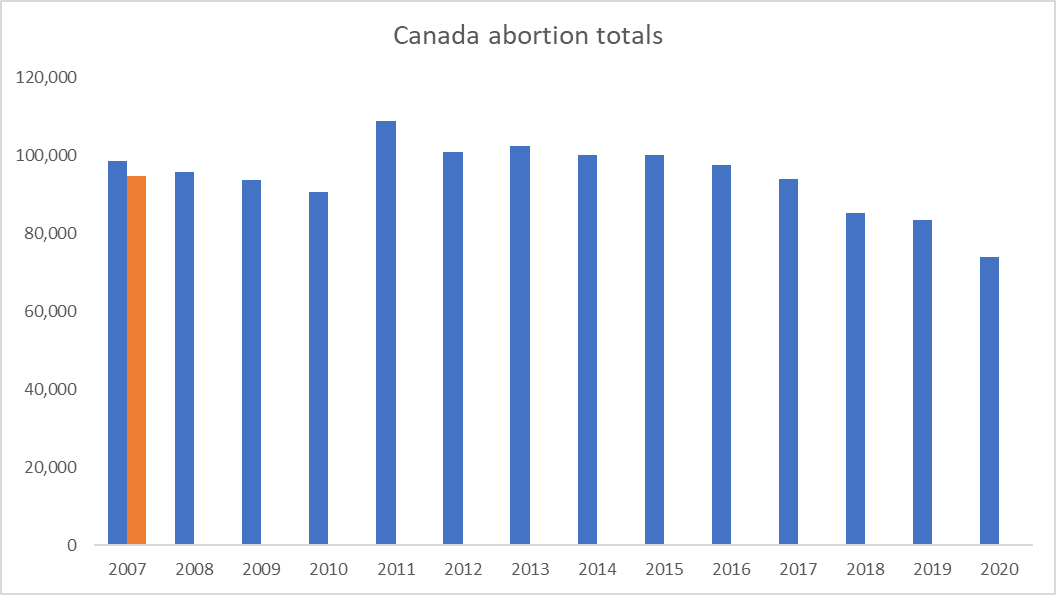
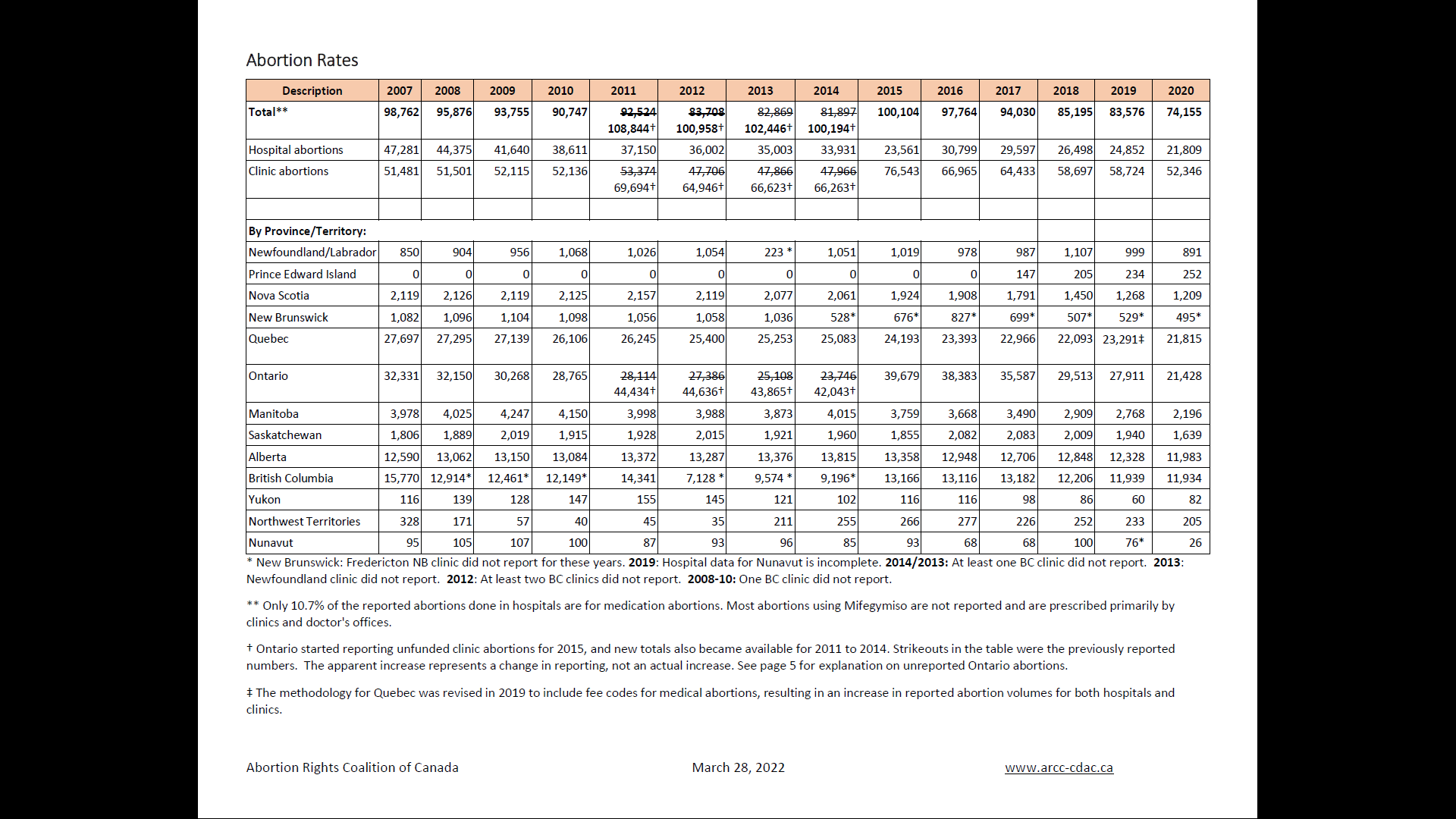 March 11, 2023 at 12:04 pm in reply to: Population decline and the disappearance of nationhood #249465
March 11, 2023 at 12:04 pm in reply to: Population decline and the disappearance of nationhood #249465Divorces in Canada began taking off during the sexual revolution and women’s liberation (from motherhood) movements of the 1970s. Perhaps there are other factors. For example, the decline of Catholic neighbourhoods and communities.
Spiking in the mid-80s, the relative decline and leveling-off of Canadian divorces may reflect not so much Canadian’s stronger commitments to each other rather than the marked increase in common-law partnerships noted above.
So it would seem common-law partnerships likely do not decline during early adulthood due to couples deciding to get married after living together. Divorce rates remained somewhat consistent while marriages declined. This would seem to suggest traditional marriages were also under siege from liberation ideology.
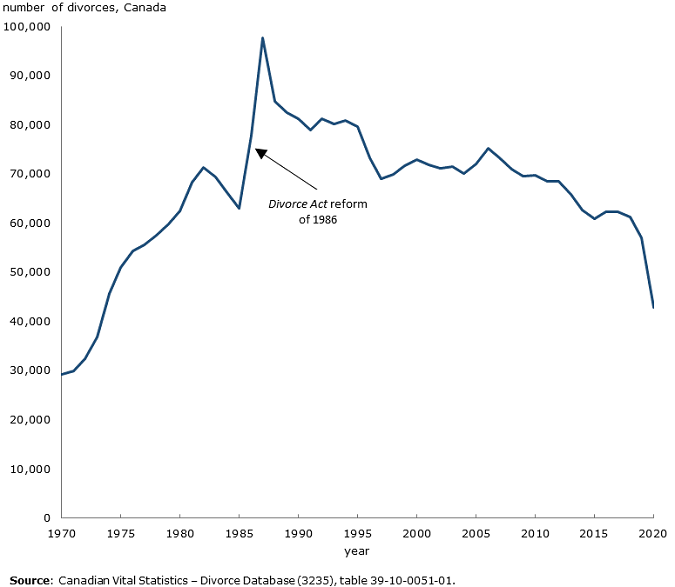 March 11, 2023 at 11:49 am in reply to: Population decline and the disappearance of nationhood #249464
March 11, 2023 at 11:49 am in reply to: Population decline and the disappearance of nationhood #249464To recap – a strong trend among Canadians is towards the preference of common-law, childless relationships.
Do Canadian common-law partnerships lead to traditional marriages? To help answer that let’s look at Canadian divorce rates.
- This reply was modified 1 year, 1 month ago by Scott Laing.
March 11, 2023 at 11:38 am in reply to: Population decline and the disappearance of nationhood #249463However, the ‘families’ or, to use the modern preferred parlance – ‘partnerships’ – in the above chart mixed traditional marriages with common-law. The chart below demonstrates how Canadian began to much prefer common-law commitments over the constraints of traditional marriages.
Combined with the trends demonstrated in the charts above, we may begin to conclude common-law relationships produce fewer children and traditional marriages produce more.
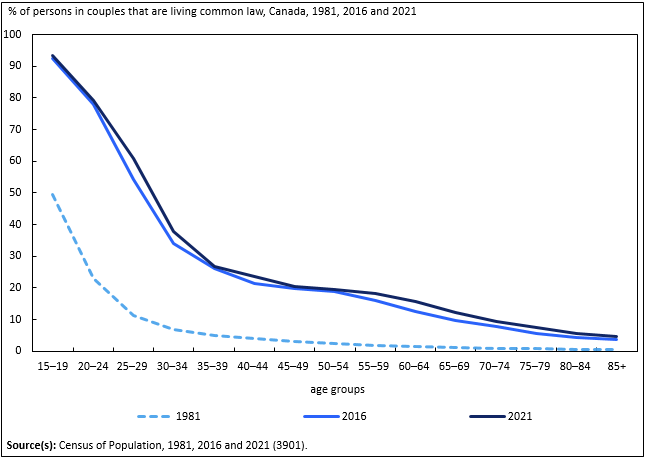 March 11, 2023 at 11:31 am in reply to: Population decline and the disappearance of nationhood #249462
March 11, 2023 at 11:31 am in reply to: Population decline and the disappearance of nationhood #249462The West adopted liberalism, an ideology that apparently sought to maximize liberation from traditional roles, values, definitions – from tradition itself. The very notion of tradition became a pejorative.
The graphs above demonstrate the modern world’s liberation from reproducing offspring.
Below, data demonstrate the rising trend in single-parent families in Canada.
Data from prior to 2006 would reveal no doubt a significant reversal in the historical trends, where single-parent families would have been much rarer.
Combined with the data chart above, Canada is trending away from multi-child families raised by parents and towards a child raised by a single mother (who is likely working).
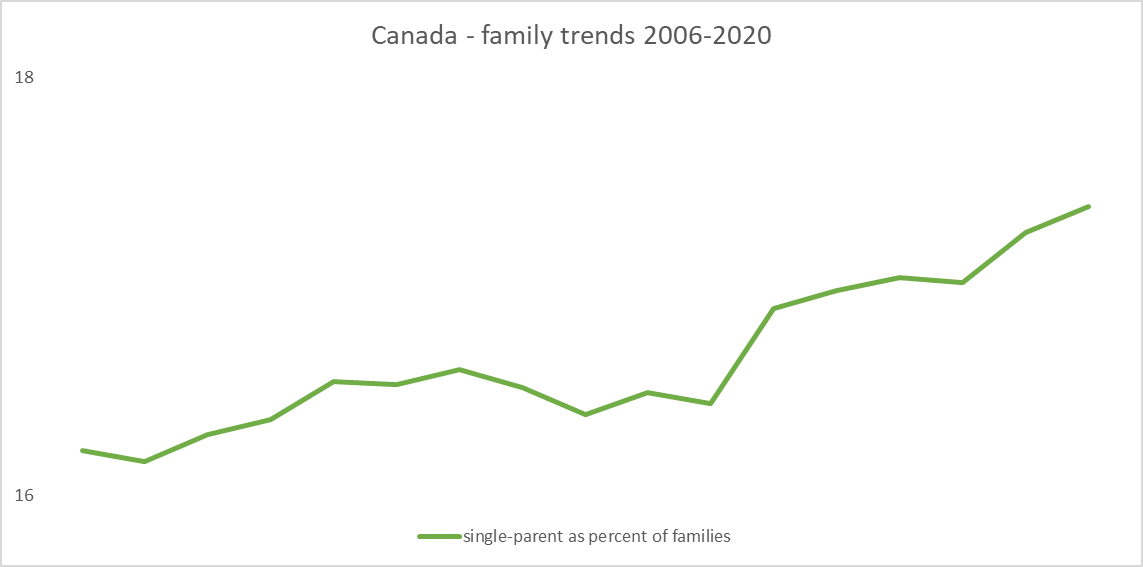
Two others I have read recently, which are not on this list but of course would recommend:
The Power and the Glory, Graham Greene
The Moviegoer, Walker Percy
I suspect either or both may add a perspective not yet strongly represented, though I don’t know. Just going by the titles I have read which are more than a few.
- This reply was modified 1 year, 1 month ago by Scott Laing.
José Saramago, Cain
Read this because I seem to recall it being recommended in a book list from this forum. Was a while back.
Short read. Maybe am jaded or impatient but I realized early on a writer would not bother to commit to writing a novel as seemingly on the nose as this appeared to be. On the nose in the sense of a not-too original, likely ancient while current, perception and critique of the Hebrew God. On the nose in the sense that why, particularly this late in his apparently storied career (had not heard of him, which means nothing), would a writer take to writing something so on the nose and hardly original.
Still, what he (Saramago) did say at the end – on the Ark – via his homicidal protagonist is worth staying up for. I don’t think it originates with Marxian philosophy but it certainly echoes through the culminations of leftist ideology into the present hour.
Is Cain right? Those who rule the West are certainly on board.
I don’t think anyone would disagree that the Bible is the core of the Christian canon…
Well,
see, the Bible is composed as we know of the Old and New Testaments. The Old is canonical as it pertains to the cultural and historical and theological developments that gave birth to Christianity (Hebrew/Ancient Judaic). The New is Christianity itself. The New however, is mostly composed of the four gospels, with most of the rest being letters.
The basic point is if you want the core of Christianity you would need no more than the four gospels. However, this restricts your sample even more of course thus making your research results even more, well, stilted. For example, even though say some of the economic practices contained in Psalms or Deuteronomy are of course biblical and therefore, according to your usage, representative of Christianity, they are, at least mostly, irrelevant to general Christian practice (Deuteronomy in question pertaining to the use of livestock, the rights and privileges of the priestly class, sabbatical years, pertaining to cities of refuge, etc.)
So a possible refinement you may wish to consider for advancing this research area (which I agree, it is an ambitious start) is both narrowing and expanding your Christian word inputs to the New Testament (and include the letters by all means) and also Church texts. Also try researching non-Church, scholarly works by Catholic scholars and philosophers. Thomas Aquinas being the obvious example.
And the legislative and courts systems of Catholic European states, particularly those of the pre-modern era. I would imagine the documentation there would be massive.
A perhaps controversial source would be among the modernist school of historical criticism congealing in the Church towards the end of the 19th century. And of course the non-modernist scholars, many of which unfortunately are obscure to Western mainstream scholarship due to the severe rise to dominance of liberal ideological censorship within Western campuses and curriculums.
Yet again, let us not forget, this so-called secular, post-Christendom state and its institutions extends of course from the Catholic state. Even now, much of the language and concepts in place, though increasingly secularized, originated within the Catholic state.
- This reply was modified 1 year, 1 month ago by Scott Laing.
A response to your post —
Anything can be ‘mere data’. It’s what we do with the data the gives meaning.
Yes, I think you understood my analogy. If I was unhappy with my wife the books may increase in value. 🙂
I mean, CP goes into depth explaining between nominal and real pricing. Same thing. Even with algorithms, of course. In fact, I think algorithms are likely the least trustworthy means of gaining an overview because: the nature of computing allows for huge sample sizes which by nature require ever more nuanced interpretations into mathematical formulae. To me the assumption is based upon the Cartesian notion of the so-called quantum world which — does just that: seeks or pretends to describe the real in mathematical formulae, to the point where it is now: mistaking the mathematical formulae for reality (Wolfgang Smith has written a lot on this)./rant
On second pass —
You introduce ideology as essential. You then dive into what you feel must be done with it. But I seem to have missed your definition of it. What I find instead is an assumption. The assumption seems to have decided that every culturally-collective idea is an ideology. Like religions or tribal myths.
An effect of this particular definition is that it then makes culturally-collective ideas flat and interchangeable. Or, relative to each other. Following this, it apparently nullifies any need for further discussion of such ‘ideologies’, for ideology is made synonymous with whatever any large body of people (say a culture or nation or tribe) happen to subscribe to, for whatever reasons.
In broader terms, humans are a cultural species, which means that our behavior is driven in large part
by our collective ideas. How and why these ideas evolve is poorly understood.To clarify, our ideas are collective because we are cultural? Or are we cultural because our ideas are collective? If the former, why are we cultural? If the latter, why are our ideas collective?
Later, you state:
Accepting that economics textbooks promulgate an ideology, then their secular language becomes
significant. Why? Because in the past, most successful ideologies were tied to religion. The reason for
this connection is easy to understand. The crux of an ideology is that it presents a myth about the social
order….I’m curious how you arrived at this, when earlier you stated that the genius of collective ideas was “poorly understood”. You seem to feel it is perfectly understood.
[EDIT REASON: I was writing as your were posting! So this is not a response to your post as I have not seen it yet]
- This reply was modified 1 year, 1 month ago by Scott Laing.
-
AuthorReplies
